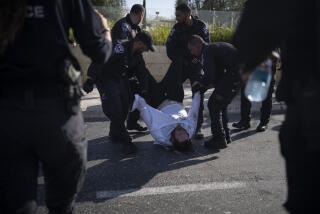Israel Will Have to Live With It
- Share via
Israelis who believe that their government should be secular and tolerant in domestic affairs and moderate and pragmatic in trying to find an accommodation with the Palestinians are in for some rough times ahead. This week’s election seems likely to produce a new governing coalition that is determined to follow a hard line on the occupied territories and to give the religiously orthodox even greater authority over domestic life. Is this what most Israelis really want? Probably not, but it’s what they have given themselves, thanks to a peculiar electoral system that seems almost to have been designed to award disproportionate influence to minority parties and narrow interests.
The election’s clearest result was its repudiation of the antagonistic Labor-Likud coalition that has governed Israel for the last four years. The significant drop in vote totals for both of the parties suggests not just a loss of confidence in their programs but, no less, a weariness with traditional leaders who have perhaps outstayed their welcome on the Israeli political scene. The big gainers were the splinter groups of the far left and far right and --most prominently--the religious parties, whose representation in the next Knesset will increase by nearly 50%. But not all of the religious parties can be assumed to share the vision of Likud and its likely right-wing partners in regard to the West Bank. One of the larger of them, Shas, believes for example that under certain conditions and safeguards the occupied territories could be given up.
The major concerns of the religious parties, though, are religious, and it is in this area that they have traditionally exacted the highest price in exchange for their political support. Orthodox Jews comprise no more than 15% of Israel’s population. But over the years, thanks to the role that the religious parties have played in forming governing coalitions, orthodox schools and institutions have been assured of generous government subsidies, orthodox religious students have been excused from compulsory military service, orthodox laws have been imposed over much of Israeli life. For years a powerful segment of the orthodox community has sought to impose a narrow legislative definition of who is a Jew--an effort that disturbs many Israelis and that has long agitated and offended most American Jews. If, as now seems likely, the religious parties contribute their weight to a new Likud-dominated coalition, the “who is a Jew” controversy will almost certainly erupt again in full fury.
The Israeli election was widely perceived, in Israel and elsewhere, as constituting a referendum on what course to follow in regard to the West Bank and Gaza district. The unspoken choice was to support Labor’s willingness to trade land for peace in negotiations or the right wing’s determination to control and perhaps even annex the occupied territories. Until the final hours of the campaign it appeared that Labor might modestly outpoll Likud. Then came the weekend’s ghastly attack by Palestinian youths on an Israeli bus on the West Bank that killed a mother and her three young children. The result, according to Labor’s own polls, was to cause a sudden swing in votes to the right. The practical consequences of thisare something that Israel and its neighbors now face having to live with for the next four years.
More to Read
Sign up for Essential California
The most important California stories and recommendations in your inbox every morning.
You may occasionally receive promotional content from the Los Angeles Times.













